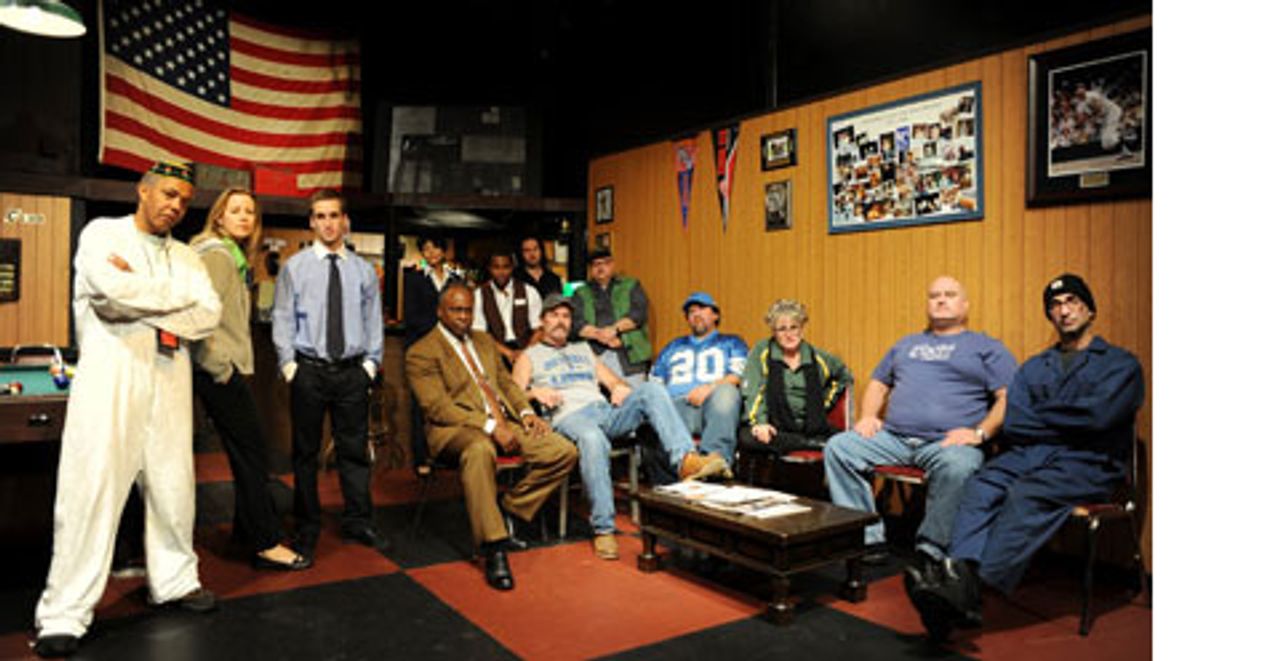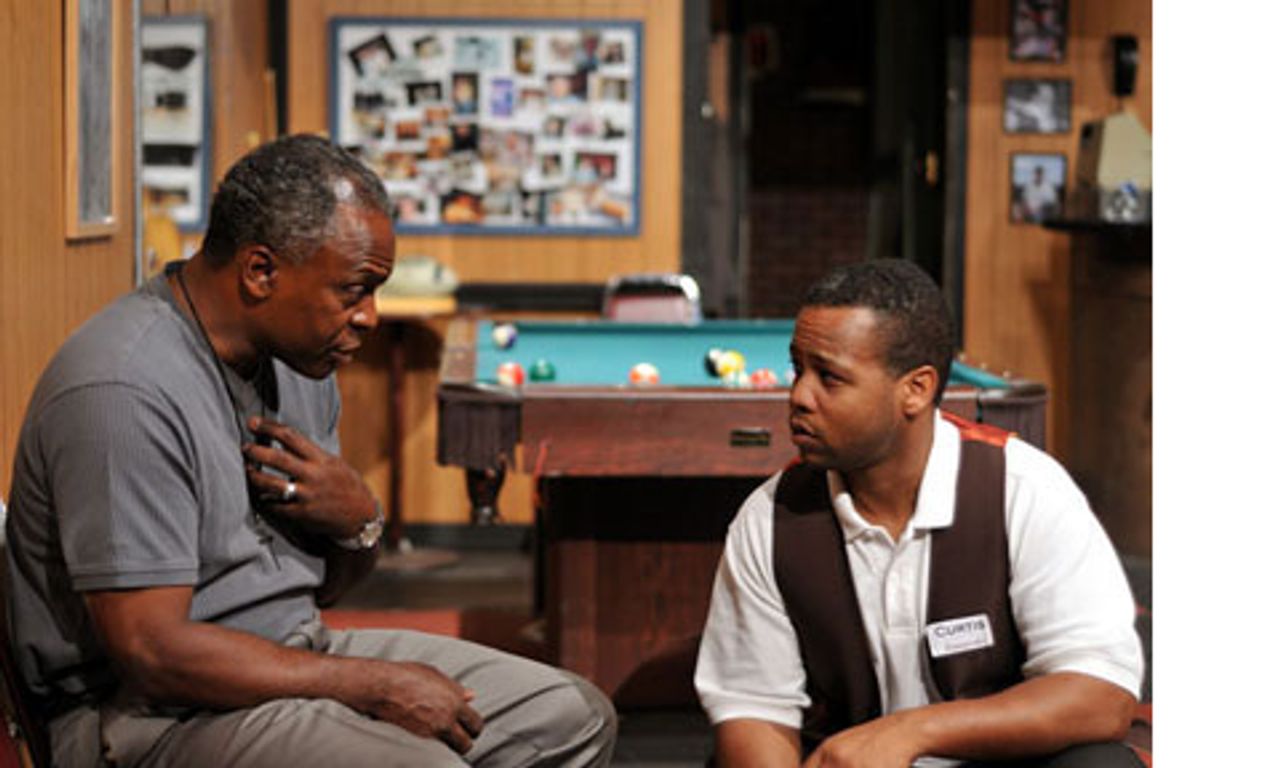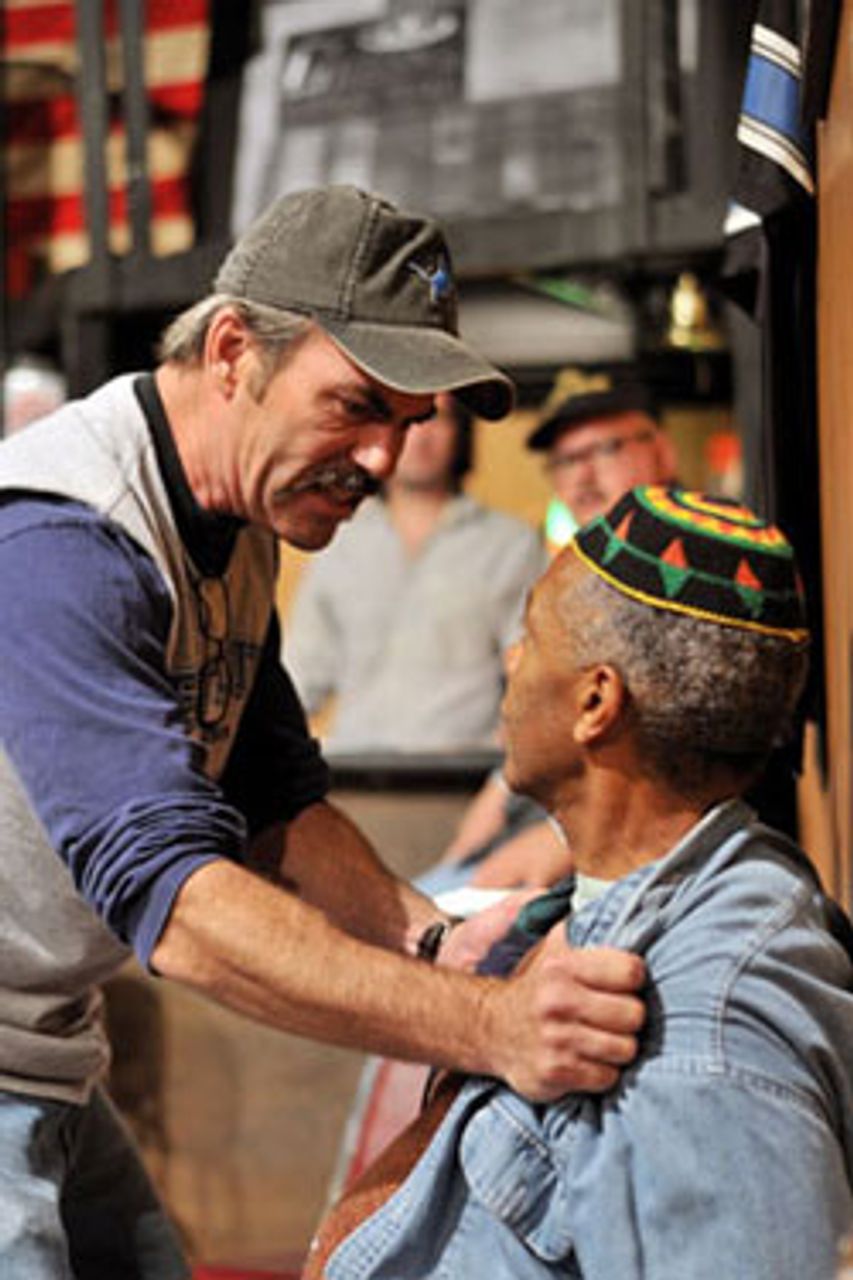Written by Vince Melocchi, directed by Guillermo Cienfuegos
 Lions, by Vince Melocchi, receiving its world premiere at the intimate Pacific Resident Theatre in Venice, California, is set in the shot and beer home of the 10th Ward Club, a neighborhood tavern with multi-racial dues-paying members, a listing pool table, and a TV tuned to ESPN or the daily lottery. Outside the club's door is the once-thriving, now-dying city of Detroit where empty office towers are being reclaimed by nature and razed neighborhoods are fast becoming urban prairies.
Lions, by Vince Melocchi, receiving its world premiere at the intimate Pacific Resident Theatre in Venice, California, is set in the shot and beer home of the 10th Ward Club, a neighborhood tavern with multi-racial dues-paying members, a listing pool table, and a TV tuned to ESPN or the daily lottery. Outside the club's door is the once-thriving, now-dying city of Detroit where empty office towers are being reclaimed by nature and razed neighborhoods are fast becoming urban prairies.
Playwright Melocchi frames his tales of lives in crisis within the hashmarks of the Detroit Lions' crushingly disappointing 2007-2008 football season. The play opens with the club members—plus a ballsy walk-in Bears fan—gathered for that strange ritual of commerce and sport known as "The NFL [National Football League] Draft." The team's hopes, and the dreams of its fans, are buoyed by Detroit's pick of a star wide receiver.
In subsequent scenes, on subsequent Sundays, these passionate fans first taste that sweet elixir of hope as their long-suffering faith and loyalty are rewarded with victory, only to have those dreams erode in yet another losing season. Having granted themselves the luxuries of hope and shared pride, their team's collapse is all that much more bitter, the despair that much deeper. One can easily imagine similar scenes playing out in neighborhood bars all across the once-mighty industrial cities and towns of the Great Lakes.
Interspersed with these scenes of fandom are others that chronicle the year-long denouement of John "Spook" Waite (Matt McKenzie), as his employment prospects, marriage and friendships spiral into an ever bleaker black hole. He's haunted by opportunities missed. Spook, whose football acumen is nothing short of awe-inspiring, understands the consequences of botching the big play. Twenty years ago, he rejected his childhood best friend's offer to join him in a sports management company. That friend, Artie (Nick Rogers), has gone on to become a major big-ticket sports agent, so successful he can "wipe his ass with fuck-you money."
 Kim Estes, Malik B. El-Amin
Kim Estes, Malik B. El-AminSpook turned Artie down because, at the time, he had a good job at Elias Metals, a wife, a family and a genuine belief that being a hard worker, good husband and provider of a house with a backyard made him "happy." Besides, Detroit was home. Now, twenty years later, Elias Metals has moved its factory to Mexico; Spook's wife, Beth (Valerie Dillman), is barely making ends meet by working the register at a Dollar Store; and Artie has begun to haunt Spook in flashbacks.
In perhaps the most wrenching scene in this emotionally powerful yet often very funny play, Beth finally leaves her husband after the family's car is repossessed. Spook—unemployed, without prospects, his benefits having run out—has been telling Beth (and himself) that "things will have to turn around," workers will be rehired because things have to be made by somebody, and who better than by working men like him.
Spook's delusions, like those of every booster of every rustbelt city, grow ever more insistent. He bottoms out, living in the basement of a friend's house, blurring the harsher edges of his reality with alcohol, and pinning his ever more attenuated hopes on the ultimate triumph of hard work and loyalty, and on a misguided belief in cyclic fate.
Spook's bar-mates fare no better. "Biscuit" (Haskell V. Anderson, III), his African-American buddy, similarly displaced from factory work, is now on call with the city morgue, "bagging corpses for fourteen bucks a pop," as morbid a version of piece-work as can be imagined. "Housepie" (Dan Cole), grappling with a host of ailments, including obesity-based diabetes, a loveless marriage, and a secret long-distance romance with a woman in Colorado, gets by on piece-work deliveries. Curtis (Alan Keith Caldwell), who loathes his job as a bagger at the local supermarket, dreams of opportunities elsewhere in places he's only seen on the Travel Channel. More than any other character in this insightful play, Curtis captures that peculiar terror and parochialism of the ghettoized.
 Matt McKenzie, Haskell V. Anderson III
Matt McKenzie, Haskell V. Anderson IIIThis is a play that understands to its sinews how hard-working men and women cling to the frayed comforts of the familiar even as the fabric of their world unravels. It's not that they don't know what's happening to them or why, or that they're lacking in intelligence or imagination, nor is it a matter of ability: each is capable, disciplined and honorable. They're simply afraid that what's bad could get so much worse. The clubhouse is a storm shelter in which to hunker down until the twisters pass.
To a man--and this is primarily a play about men—they cope with the economic maelstrom that's sweeping their world away as if this were just another stretch of bad weather. Like many Midwesterners, they suffer the elements, trusting that if they can just endure, the winds and floods and brutal winter will give way to sunshine and picnic days with friends and family. Unable to identify the forces and the perpetrators responsible for their individual and collective calamities, they attribute these depredations to something resembling fate—or weather, or a missed tackle, or a ref's bad call.
To playwright Melocchi's credit, he does not portray these living, breathing people as beautiful losers. He sympathizes with their plight, empathizing with their ill-defined aspirations and disappointments, observing with a humane yet unflinchingly sharp eye their barely checked desperation. Interestingly, the play never lets its characters wallow in mindless patriotism, even though a huge American flag looms on the wall above the bar; their loyalty is more parochial, a heartfelt devotion to their home team, their club, and their city. Because this is, essentially, a realistic play, he never imposes a view of the world that is not organic to his characters' lives and values and perspectives. He captures with breath-taking acuteness the way in which ever-mounting stress provokes "familial" explosions of rage, violence, self-abuse and accusations of betrayal.
Like prisoners who turn on one another, the "hill rats" on this sinking ship direct their fury at one another, not at the bosses, owners, and ruling elites who've run this barge onto the reef. They direct their sublimated anger at symbolic figures like Matt Millen, the Detroit Lions' general manager, whose portrait is planted on the club's dartboard. Never in any direct or explicit way do Spook or the others blame the owners, capitalists or corporate officers who profited from their labor then repaid them by abandoning them for cheaper, more exploitable labor elsewhere. Their misplaced anger complements their misplaced loyalty to their home team, and Spook's trajectory matches his waning faith in his hometown team. When defeat is finally acknowledged, there's nothing hopeful to replace it. As bar-mate Gail (Sarah Zinsser) points out, the day after her beloved Green Bay Packers won the Super Bowl, she still had to get up and go to work. The victory was theirs—the team's—not hers.
Two characters stand out for the relative stability of their lives. Reverend Stuyvants (Kim Estes) has made a religion of his faith in his hometown team. His well-timed pastoral guidance offers compassion when it's most needed, a lifeline tossed to men drowning in self doubt, self-hate and self delusion. That his advice is ultimately one of persevering and keeping the faith—not unlike sticking with a losing team in its darker moments—only highlights the absence of a broader political perspective that might channel his charges' rage toward more culpable targets.
There's some hard-won toughness in bar moll Gail's disparaging of the "shoulda woulda coulda's" that lead to self-pity. In one of the play's pithier lines, directed at Spook as he bemoans a bad choice in high school when he dropped academics to enroll in tech school (for building maintenance), she says, "If my Aunt Francine had balls, she woulda been Uncle Frank." Gail and Stuyvants remind the others that since the past cannot be rewritten, why rehash it for roads not taken. But it is that very unwillingness to take a hard analytical look at how they arrived at this moment that is symptomatic of these characters' inability to identify the historical causes of their circumstances.
While this aversion to blaming others is honorable, by not laying blame, these people can never direct their anger at the forces that brought them and their world to this pass; and without that analysis they cannot understand their shared oppression or its causes. Without such insight, these characters fall prey to the pitfalls of the "American Dream," which, in its celebration of individual achievement and material aspirations, ultimately places full responsibility for failure on individual lack of drive, ambition or vision. Or luck. Among the play's saddest moments are the televised announcements of the day's winning lotto number. Without fanfare or commentary, when the game show voice begins the call, each character pulls out his or her ticket(s), hoping against the odds that maybe this time they'll come out a winner. No one ever has. The implication is that no one ever will.
Among the play's more poignant moments are those in which the characters attempt to better their lives. Especially painful is Spook's interview with an employment counselor, Mabel (Gloria Charles), when, forced by overwhelming circumstances to abandon any residual pride, Spook wills himself to understand what it means to become part of the "service economy." A skilled metalworker, Spook eventually accepts his "fate," learning to operate a cash register, taking a job as a CVS counter man.
Director Guillermo Cienfuegos, who also designed the sets and sound, clearly worked with this uniformly talented cast to expose the human heart and soul without cliché or sentimentality. The production was refreshingly free of the condescension to and patronizing of working people that so often pollutes such material. In a play with a cast of this size, one might expect weaker links. But it is a tribute to the ensemble spirit that this was not so. Even those in minor roles, like pizza-guy Andy (Keith Stevenson), brought a commitment to the work and a specificity that had the effect of making this a thoroughly believable world.
As moving—and as entertaining—as this production is, its reluctance to reach beyond representation raises a deeper question. Does the dramatic (theatre, film, TV) artist have an obligation to go beyond quasi-naturalistic realism? Do playwrights and directors who turn their attention to the tribulations of working people have an obligation to take on some of the responsibilities of the social scientist?
To simply "hold the mirror up to nature" is not enough. Shakespeare's instruction to the players also carried a moral directive "to show virtue her feature...and the very age and body of the time his form and pressure." A century ago, American writers like Theodore Dreiser, Upton Sinclair and Sinclair Lewis, all sophisticated political thinkers, were driven to expose the greater social forces at work on their characters, pointing (or at least hinting) at courses of redemptive action.
In public comments, playwright Melocchi and producer Lisa Nichols have both emphasized the hopefulness, the up-beatness, and the nobility and dignity of these characters. While this is excusable in terms of marketing—the assumption being that in troubled times no one wants to confront depressing subjects, and getting butts in seats is the goal of such press comments—the fact is, this play captures a world full of hurt and a world and conditions that we ignore at our peril.
One hopes that this play and others like it will find a much-deserved larger audience and that such plays will evoke more astute commentary than the pity for the plight of working people that has typified the critical response thus far. This is a play that ultimately should make us suffer with its people and make us angry. It does, but only if one brings other, sterner, more historically-informed perspectives to the experience of this honest, humane and heartfelt play.
